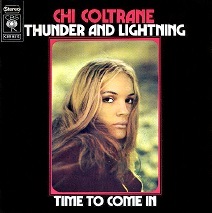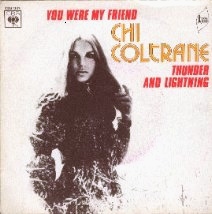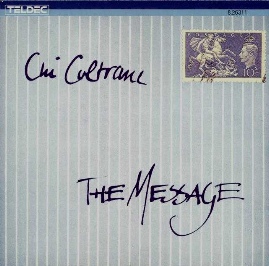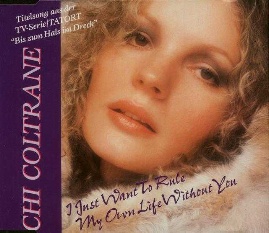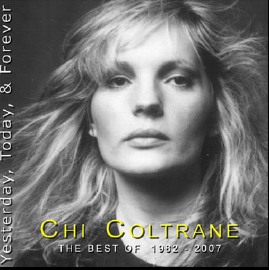Here comes . . .
There goes . . . Chi Coltrane . .
by Richard Boeth
This is all about the possible rise of a rock singer
named Chi Coltrane, but we need a little background music first....
Whenever I think upon popular American heroes, I
never fail to cast the mind back to the fighter pilots of World War
II - authentic folk idols they were, ever ready to fly their Birds
of Paradise up the other guy's nose if it meant a few less Nips for
Uncle Sammy to have to worry about. Since then, it seems, we have
got to the point where almost all our pop heroes have something
basic in common with World War II fighter pilots-one brief but glorious
arc across the sky as the whole nation cheers, then phooom and
on to the next folk hero. Andy Warhol, in his ghostly way,
caught the essence of it when he remarked that in the next generation,
everybody in the whole world is going to be famous-for five minutes.
Until that era arrives, we have a pretty good approximation
of it in the institution of the rock star. I don't refer here to
the neighborhood rock star, earning $100 a weekend at the
Dew Drop Inn and wondering where to send that demonstration record
he made last month in somebody's basement. I was thinking of the
thousand more or less professional groups and singles that have come
and gone in the last decade. They played for $2,000 or so a night-
superloud, derivative electronic whingwhang with too much past and
no future-warming up the concert crowds for Sly and the Family Stone
or Poco, and maybe putting out one album on Buddah Records, plus
a hit single that reached number eighty-seven on the charts. These
near-miss groups got a very brief, very dizzy ride for their pains.
One minute the air was thick with grass and adulation; they rode
limos to the airport with groupies in the glove compartment and a
tax man riding shotgun trying to help them figure out where last
year's $200,000 went. The next minute everything was gone (it wasn't
really there to begin with, of course), and the lead singer
was back driving a taxi in Detroit and dreaming of the second big
break that would almost surely never come.
There is a big dream behind it all, however-and it
is this large economy-size job that keeps the whole carnival spinning.
Every knock- kneed banjo player, every mudcolored group catastrophe,
has visions of becoming the rock trade's newest Messiah: the He,
She or It who will turn out to be another true superstar,
someone who will bridge the great divide between rock and pop and
will go on selling records, year after year and million after million.
Presley, the Beatles, Dylan, the Stones, now maybe James Taylor,
Carole King, Cat Stevens-all these performers were and are true superstars,
true perennials, arners of legitimate bankable millions in their
own right and of millions more for all those record companies, electronics
manufacturers, rack jobbers, and simple unassuming ticket-scalpers
who work the Felt Forum and the Portland Auditorium. Where will we
find their like again?
Where, indeed? Actually, the superstars are hardly
monuments to permanence themselves (always excepting Presley). Hendrix,
Joplin and Morrison are dead, the Beatles have split up, and while
it may be too early to predict just when the string will run out
on the rest, it doesn't seem unfair to say that rock superstars have
a natural performing life of a decade or less. That's enough, really.
The economics of the music business today are such that Dylan can
make more money in five years than Duke Ellington has in fifty-so
five colossal years count as a whole career now, and the
record companies are constantly on the prowl for anyone with any
sort of potential for making it into orbit that long. So it's a fascinating
and elusive chase, made up in about equal parts of hard show-biz
professionalism and soft, dreamy-eyed divination and wishful thinking.
The odds are enormously against anyone's making it all the
way to the top rung, but the rewards are so huge up there that the
performers and the record companies alike can't resist taking an
expensive crack at it whenever the slightest plausible long shot
presents itself. So here, for your edification, is the story of one
Plausible Long Shot: a pop-rock singer still only in the larval stage,
promotionally speaking, but one who has been picked out for the big
push by Columbia Records, which has a track record of pouring more
money, determination and know-how into these cosmic creations than
anyone in the business. And still the odds are enormous
that our heroine won't be any more of a household name a year from
now than she is today. What makes it fun is the other possibility,
the one- in-a-million chance that by the time you read this our heroine
will be rubbing royalties with Melanie and Laura Nyro-or maybe even
with Carly Simon and Carole King. Ready, set, go.
She is called Chi Coltrane,
and she wants it known that this is her real name, so why not?
The Chi is pronounced "shy," the
Coltrane is no relation to the great jazzman John Coltrane, and it
is possible that you have heard of her already. Her first album,
which came out in the spring of 1972, sold something close to 100,000
copies (and we shall have more to say on this in a moment). One single
derived from that album, a driving, up-tempo member called "Thunder
and Lightning," reached member thirteen on the national charts
that summer, selling about 500,000 copies overall, and in a few cities
such as Boston and Chicago it was one of the biggest hits of the
season.
Chi is an honest twenty-five now (she usually knocks
a couple of years off her age out of fear that the teen-agers, who
are every rock musician's lodestar, will have more trouble relating
to an older woman), and she is in every way a splendid singer person:
smart, gifted, determined, pretty, ballsy, and very good at what
she does. What she does is play half a dozen musical instruments,
preeminently a piano from which she coaxes everything from piano-bar
kitsch to funky back-alley blues, and sings. Her songs cut across
a similar range: reedy little Carole King-like laments, whammy up-tempo
revival numbers, earnest and well-meant blues that just don't have
enough sex in them to warrant comparison with Joplin (much less Nina
Simone) but that sound pretty good in comparison to a nice sweet
thing like, say, Carly Simon. Chi writes all her own material, too.
Shez didn't use to, not until a couple of years ago, but then she
figured out that all the really big rock stars write their
owns songs. Anything the big girls do, Chi figures she can do, too.
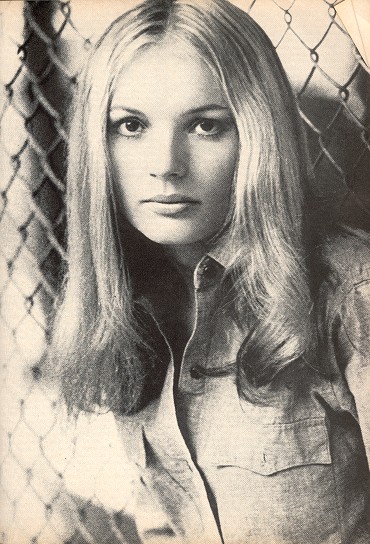
It would seem from all these
qualifications that Chi is pretty well set. She has talent, experience,
one well-received if not quite sensational album already on the
market and another aborning. Best of all, she boasts the standard
one plus-four recording contract with Columbia - meaning that Columbia
promises to bring out one Coltrane LP in the first year of their
association (as it has already done), with the option to renew
each year for four more years. Chi's option for the second year
has already been picked up, and Columbia remains genuinely and
all but irrepressibly excited about her future. Too many people
believe in Chi for her to have much chance of failing-everybody
from Clive Davis, [then] company president, on down," says Bob
Altschuler, Columbia's publicity chief but not a wholly irresponsible
source of information for all that. "It's overwhelming, it's
all one-sided. Everybody thinks she's going to be the next
real superstar." And this could be the truth.
So what is this girl's problem'? Why is all the talk
about Chi's future when it would seem to any casual observer
that she is doing pretty well right now? Answers in a moment, but
first let me bolster the illusion of her present success even further.
Just from her first album- with its hit single, "Thunder and
Lightning" - Chi would seem to have pulled in enough money to
keep anyone but a glutton in truffles, for a few months, anyway.
Under her contract with Columbia, she earns about forty-five cents
from every LP as a performer, plus another twenty cents as composer-
a total of almost $60,000 if we figure on a conservative basis of
ninety thousand albums sold. The single brought her a nickel a record-add
another $25,000. Then there were air-plays; as composer of " "Thunder
and Lightning," she received two cents every time the song was
played on a commercial radio station in this country. Figure six
plays a day on 3.600 radio stations for the four weeks the record
was hot, and that comes to another $12,000 or so, making for a grand
total (flourish of trumpets) of about $85.000, not counting the $21,000
that Columbia, a talent agency, and various clubs threw in last August
to underwrite a promotional tour.
That's not bad bread, or at
least it wouldn't be if it were real. But the truth is that Chi
is living in a $200-a-month apartment in West Hollywood, on the
unfashionable side of the Sunset Strip. She drives a battered heap
in place of the white Lincoln Continental she once had in Chicago
(it got totaled by an oil truck), and the mink coat once shimmering
in the closet has long since been sold to pay the rent. All the
money from her records has gone to pay off various necessary advances
from Columbia, and she is tens of thousands of dollars "in debt" to the record company, various lawyers,
agents, managers and arrangers. It's impossible to put a hard figure
on Chi's "indebtedness," because much of it is as illusory
as her wealth, that is. Various people and companies have advanced
her all kinds of services, facilities and expertise in the expectation
that she will someday make it big. If she does, she pays them off;
if not, or if she drops out to join a Nepalese nunnery, everyone's
all square. In the meantime, though, Chi literally struggles along
close to flat - broke on what looks at first glance like an "income" of
better than $100,000 a year but is, he truth, a fraction of that.
What she actually lived on for the last five months of 1972 was $3,000
carefully saved from her promotional tour.
To understand how this very appealing girl got into
this perfectly typical fix (typical for a young recording artist,
anyway), we had better double back to the thrilling days of yesteryear
when Chi was trying to hack it as a sometime saloon pianist, sometime
hard-rock bandleader in Chicago. This would have been the late summer
of 1971, and things were both good and bad for Chi. She had spent
the year before pouring most of her money, energy and soul into trying
to make a go of her own band, known (naturally) as Chi Coltrane,
and had come out of the experience weary, broke and sort of brittle
- the state of mind in which you think you are tough as hell but
you're really ready to crack the minute somebody taps on you. Add
to the saga an unsuccessful marriage that had finally ended after
four draggy years - that was a help. She had also been picked to
represent the U.S. at an international rock festival in Rio (Elton
John had been U.S. representative the year before), and that was
good. Chi was also working regularly in such places as the Executive
House and the Back End in Chicago, but the long- range career didn't
seem to have many mountaintops in its future, and Chi was perhaps
a little more receptive than she should have been when a Chicago
theatrical personage told her he had the contacts to put her into
records and concerts-otherwise known as The Big Time. Chi signed
him on as her personal manager, then began discovering, she says,
that his contacts weren't quite the right sort. "He knew a lot
of actors and actresses," she says, but that didn't help me." Her
new manager did persuade her to move to the West Coast, however,
and she booked herself into a couple of pretty good clubs and wangled
some guest shots on national TV, notably on the Merv Griffin show.
What she needed, however, was a record contract, and that still wasn't
forthcoming. So Chi took on another partner, an able and
knowledgeable independent record producer named Mike Gruber, and
with him formed Just Us Productions, whose sole purpose was to package
and peddle Chi Coltrane to a big record company.
That, as it turned out, was
a fairly easy thing to do. Chi had been writing material for some
months, and had six songs ready to go; using just bass, drums and
a guitar for background, and spending little more than $1,000,
Chi and Gruber produced a demonstration tape with six songs on
it. Gruber then called Paul Baratta, a veteran Artists and Repertoire
executive at Columbia's Los Angeles office, and said, "I have a tape of Chi Coltrane's, and I think she's
going to be a superstar." Veteran A&R men are supposed to
be skeptical, but Baratta evidently didn't take much persuading.
An oldtime theatrical casting agent, he tends to judge people by
how they move. When he saw Chi walk into his office-all
chunky hard-packed energy, with that pretty blond head riding above
- he instantly became the mentor, guide and champion she had been
looking for ever since she started singing for nickels and dimes
in Zion, Illinois, seven years earlier. "Even before I heard
anything,'' Baratta told me, "I thought she was the most emotion-filled
talent I'd ever felt." The demo nailed it. Baratta immediately
called Clive Davis at executive headquarters in New York and insisted
on fetching Chi with him to meet Davis. "Davis would have gone
along just on my faith." Baratta says, "but I wanted him
to be involved."
Chi went to New York, conquered
Davis, and went back out to the Coast to cut her first record in
February of 1972. An uptown production using nine first-rate sidemen
and a chorus; the eleven tunes took two weeks to record, with everybody
working ten six-hour sessions, and then three weeks on top of that
to do the "mixing" (the
balancing and blending of song and rhythm tracks, and in this case
the addition electronically of occasional horn or string backgrounds).
When it was done, Chi sent the master tape to New York, where the
ponderous machinery of Columbia's marketing and promotion departments
groaned into action. In all, about fifty different executives and
department heads crowded into Clive Davis's office to listen to the
master tape (for most of them, it was the first time they had heard
their latest phenom). Preliminary decisions were made about which
songs might go best as singles. Chi herself-who had done everything
from writing arrangements to booking hotel space in her knockabout
musical career-flew into New York again and made herself known and
agreeable to all the key hands, including the executives in charge
of A&R, marketing, artist relations, publicity, cover design,
the lot. About $10,000 was budgeted for ads, mostly in trade publications:
a free-lance West Coast publicity outfit was signed on to do additional
tub-thumping at $800 a week: a three- month tour was laid on for
Chi and a backup group in Denver, San Francisco, Boston, Chicago,
New York, Philadelphia, Brooklyn, Washington (D.C.), Los Angeles
and Ipswich (Massachusetts).
Chi now calls the tour "the hardest thing I've
ever done in my life." Daddy Columbia had included a road manager
in the traveling carnival, but Chi's years in the back alleys of
the music business had left her with the feeling-which she still
has, to the eye-rolling annoyance of some of the people who work
with her-that nothing will ever get done unless she does it. "I
put together the group, made air and hotel reservations, paid the
bills, handled the phone calls, talked to writers and deejays, and
rented the trucks for the sound equipment," Chi told me at lunch
in New York recently. "There were supposed to be two guys doubling
up in each of two hotel rooms, and me in a single. But two of them
were clean livers and two were swingers. The swingers wanted a room
of their own, so I ended up sleeping on a cot with the two clean
livers while the swingers got room to play."
The purpose of the tour, of
course, was not simply to introduce Chi to new club audiences but
to reach the disc jockeys, who for the most part were tranquilly
unaware of her existence. The ultimate object was what Altschuler
calls "the single hardest
thing in the whole world-getting airplay."
Whether it was the tour, Columbia's
promotion efforts, the merit of the album itself, including the
now-released single of "Thunder and Lightning," whatever
was most responsible for turning the trick, Chi did begin
to get her precious air-play soon after her tour began in May.
Boston was the first city to go for her in a big way: the disc
jockeys in Chicago picked her up a little later (without knowing
what was happening in Boston), and several other key areas followed.
New York didn't join the group. Despite a big ride on WCBS-FM, "Thunder and Lightning" was
never a major wow in New York, a provincial town, musically speaking,
which generally doesn't catch on to a new singer until all the rest
of the world has caught on first. Still, the single made it up to
number thirteen nationwide one week, a performance that, for a newcomer,
ranks somewhere between sensational and dynamite.
All these happy successes represent the rosy side
of the saga of the Plausible Long-Shot. What I've left out so far,
in the interests of narrative clarity and suspense, is the fact that
Chi Coltrane during this period of her glamorous emergence into the
big time was as hassled and frightened as a chick can be -and, if
anything, getting poorer by the minute. The economics of the record
business is made up of some dazzling high-energy numbers, but these
very rarely break down to the immediate enrichment of the performer.
The largest worm in the apple
is that all recording artists pay the production costs on their
own records-or "borrow" them,
as is more likely, as an advance from the record company. Chi's first
LP was not an extravagant production, but it was well and carefully
done, with good musicians and technical equipment and no corners
cut in the studio. The result was that the record cost Columbia something
close to $100,000 to produce, all of which went down in the little
black ledger to be deducted from Chi's royalties as they came in.
As we saw earlier, Chi has earned about $60,000 from the LP so far
on sales of about ninety thousand copies-so she still owes the record
company something like $40,000 just to get off the nut on her first
LP. This may or may not be unfair, but is certainly standard practice:
Paul Baratta told me that a performer has to figure on selling about
175,000 LPs and perhaps half a million singles before he, she or
it begins to show a net plus.
The record company itself is not in so tough a bind.
Though Columbia pays promotional and marketing expenses out of its
own pocket, it still figures to net close to a dollar on the $3 wholesale
price of a pop or rock LP. What this means is that the record company-unlike
the performer-breaks even on LP sales of about fifty thousand, so
Columbia made out all right on Chi's first album.
In Chi's case, the financial picture was a good deal
worse even than we've seen so far. All the figures about royalties
up to this point have been given as if these earnings went wholly
to Chi-which they rather spectacularly did not. By the time she had
finished signing up with her personal agent in Chicago-she is still
bound to him in some mysterious legal way and Mike Gruber and Just
Us Productions in Los Angeles, Chi had managed to divest herself
of something more than 50 percent of her own earnings, often in fairly
complicated ways. All her music, for example, was copyrighted and
published under the name Chinick Music-a partnership between her
and her original manager. So there went half of her composer's royalties
right there, and it would not have been unusual (though I do not
know that was the case here) for her manager to have taken about
- 25 percent of her half of these royalties as a fee for
personal services. Just Us Productions, which is to say Mike Gruber,
also came in for a percentage of her earnings off the top, and there
were a hundred other hidden costs for a neophyte to hang up against.
An arranger named Toxey French made a few suggestions during the
cutting of Chi's LP (almost none of them were used, she says) and
submitted a bill for $1,800. This was not out of the ordinary in
any way, but Chi still feels that she was booby-trapped. "Toxey
didn't rip me off," she said. My own inexperience ripped me
off." All in all, Chi was cut up so many ways that her nominal
earnings of $100,000 in 1972 really came down to less than a half
of that - and every penny of what she did make was spoken
for before she properly got her hands on it, anyway. Chi has now
hired some good lawyers (high-priced ones) to try to negotiate her
way out of this mess with all her managers and agents but the likelihood
is that she is going to have to be very rich indeed before she stops
being poor.
What keeps this story from being an all-out tear-jerker
is the internal evidence that Chi may well have survived too much
for too long to let anything stop her when she is this close
to cashing in big. She grew up grubby-poor in the rundown factory
town of Racine, Wisconsin, one of seven children in a family so rootless
that Chi attended twelve different grade schools in eight years.
Music was her one salvation. She learned to play about eight instruments
by ear, the piano supreme among them, and took her early influences
where she found them - Strauss waltzes, Stephen Foster, even Liberace
on the tiny tube. Leaving at seventeen she began singing weekends,
just for kicks, with bands in small clubs just across the state line
in Illinois. More out of boredom than anything else, she began working
a few little clubs in Chicago about five years ago. From the start,
she had a sort of schizophrenic career. Part of the time she spent
singing rock, blues and gospel with black bands in out-of-the-way
joints in Chicago; part of the time she spent hired out (at about
$300 a week) to genteel cocktail bars, playing piano and crooning. "The
piano bars were a drag," she says. But the money was good there,
and she stayed at it at least part-time until the summer of 1970.
Chi's subsequent attempts to make it as a rock star- first with her
band, and then later as a solo performer-not only took most of her
assets but also most of what was left of her trust in her fellow
man. It is perhaps not irrelevant that she became a Jesus freak in
those dark days-and still is, though she doesn't talk about it much
except among other JFs. Christian fellowship provides her only deep
human contact: she has little to do with guys, singular or plural,
and has no real friends, except maybe for Columbia's avuncular Paul
Baratta and his wife.
But soon the college and concert dates and the touring
will resume, with Columbia Records doing its part by ferrying
in disc jockeys, wholesalers, newspaper reviewers, and everyone else
in the business to listen to the new sensation. By that time, the
new LP will be out, and Chi will have passed one more milestone on
the rock star's road to success. What milestone? Why, Chi Coltrane
will be another $100,000 or so in the hole, and that's the surest
sign of stardom there is.
![]()
![]()











